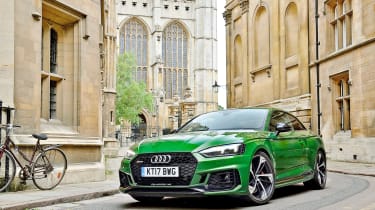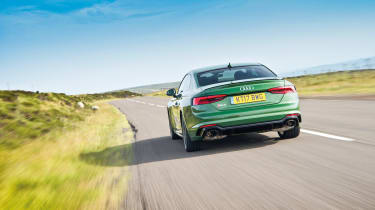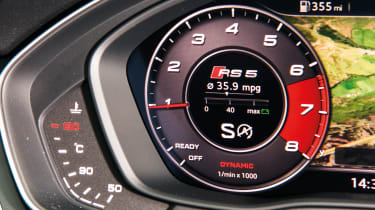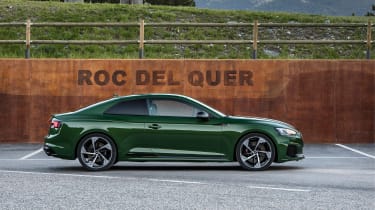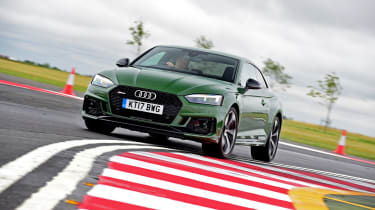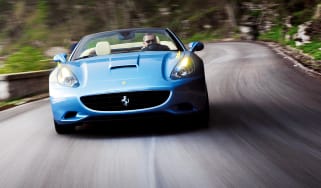2017 Audi RS5 review - Audi's most entertaining coupe yet?
A more rounded car than before, delivering crushing all-weather pace, but comfort and refinement comes at the expense of character
The original Audi RS5 debuted in 2010 and was arguably the brand’s best attempt yet to recapture the magic of its legendary ur Quattro. Featuring a similar four-seat coupe body, flared wheel arches and four-wheel drive, it ticked all the right boxes. And while it lacked the original’s five-cylinder soundtrack, it compensated with its howling V8.
In fact, this naturally aspirated 4.2-litre 8-cylinder unit was the dynamic highlight. The rest of the car just failed to live up to the promise of its raw ingredients. It was fast and composed, but it lacked the driver involvement that marked out the best, such as the BMW M4.
However, there’s now an all-new Audi RS5 that’s been developed to address the old version’s shortcomings. Lighter, faster and powered by a powerful new twin turbocharged V6, it promises to be one of the firm’s most engaging and entertaining machines yet. At least that’s what Audi claims.
The new RS5 certainly looks the part, thanks to muscular styling that’s said to be influenced by the firm’s monstrous 90 quattro IMSA GTO race car, which dominated American sportscar racing in late eighties.
Based on the standard A5 Coupe, the RS gets subtly pumped wheelarches, a larger grille and a deeper front bumper that’s crammed with intakes and sharply defined creases. Neat touches include the small vents either side of the headlamps and tail lights, plus the familiar silver door mirror caps.
More reviews
In-depth reviews
Reviews
Inside, the RS5 builds on the foundations of the standard A5, which means few rivals come close for quality or upmarket appeal. The slick design is enhanced by some carefully chosen upgrades, including alcantara coverings for the steering wheel and gear selector, a smattering of RS5 badges and some supremely supportive high-backed seats.
Tech fans can revel in the now familiar Virtual Cockpit, which is standard. Featuring a 12.3-inch configurable TFT screen, it features a host of useful functions, plus a barrage of performance data, such as turbo boost pressure and a G-meter.
Yet perhaps the biggest change is to be found under the heavily creased bonnet, where the current trend for downsizing means you’ll now find a twin-turbocharged 2.9-litre V6. It delivers the same 444bhp as the old car, but torque has swelled by 125lb ft to a heady 443lb ft.
There’s also a new eight-speed auto that replaces the seven speed S tronic, plus the four-wheel drive system has been tweaked to react faster for more natural handling. As before, the torque is split 40/60 front to rear, but the system can send up to 70 percent of the engine’s output to the rear axle in extreme situations.
Finally, Audi’s engineers have put the RS5 on a diet, with savings of up 60kg over the old car. Select the optional carbon fibre roof panel, forged alloy wheels and ceramic brakes, and you can save even more.
Technical highlights
Audi has left no stone unturned in its quest to make the RS5 a more engaging drivers’ car than its predecessor. A key aim of the development process was weight reduction, with the result that the car is up to 60kg lighter than before, tipping the scales at 1,655kg – the Mercedes-AMG C63 weighs in at 1,710kg, but the BMW M4 is just 1,585kg.
The use of aluminium and high-strength steel in the structure means that the body is 15kg lighter. The front and rear axle assemblies are 6kg and 5kg lighter respectively, while the electro mechanical steering gear shaves a further 3.5kg.
And if that’s not enough for you, then the optional carbon fibre roof panel cuts a further 3kg, while the milled and forged alloys are 8kg lighter than the standard rims. Unsprung mass is further reduced by the ceramic brakes, which chop a further 8kg from the kerbweight.
The biggest reduction, however, is reserved for the engine. With fewer cylinders than before, the 2.9-litre unit is an impressive 31kg lighter than the old V8. That’s a big saving, and one that aims to boost performance and, crucially, improve the handling.
Another big change is adoption of the eight-speed automatic gearbox in place of the old car’s twin-clutch set-up. It’s claimed to shift gears just as quickly, while the computer controlling the transmission learns the driver’s behaviour, which allows it to react faster and more intuitively. On the move, drivers can choose between Drive, Sport and manual changes via the steering wheel mounted paddles.
As before, the RS5 features a specially developed version of the brand’s quattro all-wheel drive system. It’s permanently engaged with a standard torque split of 40/60 front to rear – a set-up that’s claimed to deliver more agile handling. Yet it has the ability to vary the torque channeled to either axle depending on the conditions, with front able to take up to 85 percent of the engine’s effort and the rear 70 percent. More importantly, this process now happens more quickly, helping to promote more natural handling characteristics.
Also included on all UK cars is the Sport rear differential, which can shuffle power across the axle and, in extreme situations, overdrive the outside wheel for a more rear-wheel drive feel.
Engine, transmission and 0-62mph time
Given the weight-savings, the extra torque and the greater number of gears, it’s no surprise to find the Audi is rabidly quick off the line. For instance, the firm claims the 0-62mph sprint is covered in an electrifying 3.9 seconds – neither the M4 nor C63 can duck under the four second barrier. What’s more, the combination of launch control and four-wheel drive mean that this figure can be achieved come rain or shine.
Yet on the move the RS5 never feels as dramatic as the figures suggest. Make no mistake; the Audi is a seriously quick car that can cover ground with truly indecent haste. Yet the extremely linear power delivery (peak torque of 443lb ft is delivered at 1,900rpm) means it feels, well, just a little flat. There’s not the high-end frenzy you get in a BMW M4 or the instant, sledgehammer blow of the AMG.
This is partly down to the engine’s delivery, and partly the drama-dulling effects of four-wheel drive and a slick, seamless gearchange. Also playing its part is the muted soundtrack, which lacks the spine-tingling, 8,000rpm-chasing excitement of the old naturally aspirated V8. There’s a muted growl when you really start to work it, but it’s not a noise that has you deliberately holding onto each gear just to hear it again. You are further discouraged from doing this by the small, cheap-feeling plastic paddles on the wheel, which are a far cry from the gorgeous aluminium items on the Alfa Romeo Giulia Quadrafoglio.
Selecting the car’s Dynamic model sharpens the gearchanges, plus it adds some bass to the engine note, as well as more obvious exhaust rasp on upshifts. It also initiates a strange noise on the overrun that sounds like there’s someone trapped in the boot and they’re playing the drums to attract your attention.
What’s it like to drive?
Before you even so much as open the driver’s door Audi is keen to point out that the RS5 has been designed to cover a wider brief than its immediate rivals. In fact, bosses stress that this is a high performance GT car that can be transformed into razor-sharp sports coupe as and when the mood takes.
Leave the car to its own devices in Auto mode (there’s also Comfort, Dynamic and Individual, where you can pick ‘n’ mix your favourite engine, steering, suspension and transmission settings) and the RS5 is impressively easy going. The optional adaptive dampers soak up bumps that would send a shudder through the M4 and C63, while the transmission slurs unobtrusively up the gears as quickly as possible. Yet with so much torque available at such low revs, the Audi still accelerates strongly. As a car to use everyday on everything from scarred city streets to smooth motorways, the cultured Audi is unrivalled.
However, choose the Dynamic setting and the RS5 feels more focused. The ride takes on an instantly harder edge, weight is added to the steering, the engine gets louder and throttle response is sharpened. It’s all very promising.
Turn into a corner and it’s immediately clear the RS5 feels lighter on its feet than the old car. With less weight over the nose and quicker steering the RS5 turns in more eagerly, while the firmed-up dampers help keep it on an even keel during harder cornering. And with the benefit of four-wheel drive traction, the Audi fires out of corners with the sort of rocket-propelled energy that its rear-drive rivals can’t match. If you want to travel from point-to-point as quickly as possible, the RS5 has few equals in this class.
It’s more organic in feel than before, flowing down roads that the old car often felt like it was taking in scrappy chunks. This is largely down to the improved quattro four-wheel drive, which seems more natural than before. Power hard out of a tight corner and there’s a sense the rear axle is helping rotate the tail a little, reducing understeer and helping you carry more speed down the next straight. Be more aggressive and in slippery conditions the car will start to slide – although the system quickly sends torque to the front wheels to counter this.
Despite all this, you never really feel fully engaged in the process. There’s no real finesse involved in attacking a series of corners; simply turn the wheel, bury the throttle and let the transmission do the rest.
And while the steering is quick, accurate and naturally weighted, it lacks any real feedback. The Audi RS5 isn’t as throttle adjustable as its rivals either, meaning you have fewer options into and out of corners. Carry a little too much speed into a bend and you get mild understeer, which can be cancelled out by lifting off. However, try and tighten the car’s line with a little more throttle, and the Audi washes even further wide.
You shouldn’t let these issues distract you from the fact that dynamically, the RS5 is a vast improvement over its predecessor. And as ever with quick Audis, its ability to safely and securely cover ground at an alarming rate in all weathers is unrivalled.
Price and rivals
The Audi RS5 weighs in at £62,900, which means it undercuts natural rivals such as the BMW M4 Competition Pack (£64,010) and Mercedes-AMG C63 (£63,475).
It matches the competition for kit, too, with sat-nav, LED headlamps, and Nappa leather seat trim. Yet it’s still possible to go overboard with options and splash out on items such as 20-speaker Bang and Olufsen hi-fi, a carbon fibre exterior styling pack and a driver pack that raises the top speed to 174mph.
